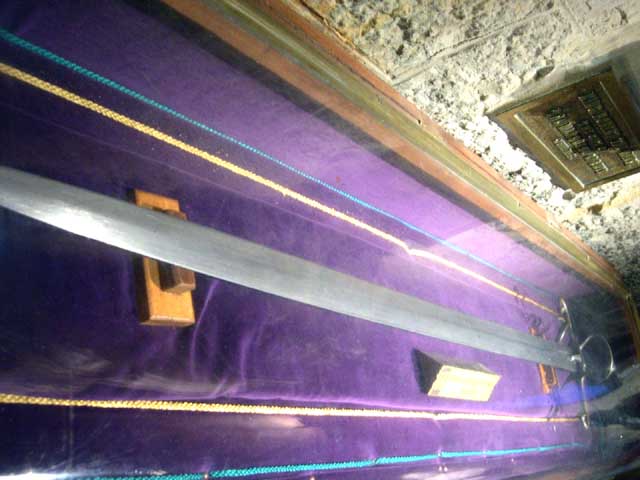Now my copy, made by Ian Macallen, is supposedly spot on the original. The accompanying literature Ian sent said he spent a couple of days measuring the sword. Well, if he did, then he is nearly blind and cannot measure for crap. The hilt and handle are exactly as the original (minus the bent rings). What is way out of wack is the blade. The Macallen reproduction has no distal or any other kind of taper. Having believed his story and heard the blade was "crude" , I figured this was the way the original was. because of this, I too had the sword as a ceremonial bearing sword that was attributed to William Wallace for sentimental reasons only. Now having seen the original, I can really believe this was a sword that could have actually been used.
The blade is not overly thick and is of slightly oval cross-section. In the picture I took below, you can clearly see the taper in the blade to the point. That sword would definitely NOT be so blade-heavy as the reproduction I bought. The blade is "crude" but I have my doubts that it was originally made this way. This sword, if it is truly of 13th century make, has been though a lot. The low light levels make things difficult and I have seen only Viking originals, but the patina on the blade just "looked" old and I think may account for some of the "crude" look. Also, the lines of the blade were not clean and crisp, but it makes me wonder why this is so ( poor manufacture or sharpening?).
It is obvious from my writings here that I was both impressed and that I want to believe that this was a sword Wallace used. I think that the 16th century hilt and handle, which if severely overly big, lead people to think too quickly that this is a later bearing sword and dismiss it's rumored original too quickly. Surely, this is a sword that begs for more serious study given it's importance and providence.
Anyway, I am pissed now with my Macallen reproduction and I am willing to sell it for MUCH less than I bought it for. Here is one of the few good pics I got of the original. Craig Johnson over at Arms&Armor made a custom version of the sword used in the movie Braveheart. That blade was much more like the original than the Macallen sword was. anyway those are my original impressions and here are the pics of the two swords. First, the original:

The Sword of William Wallace in the National Wallace Monument, Stirling, Scotland

